Quebec’s Oddball
Swear Words:
A How-To
by Evelyn Reid
Originally published on About.com July 23, 2011
French swear words, as with swear words in general, typically make reference to bodily excretions, orificial waste, sexual acts, incest, wedlock-free conception, and sun-deprived body parts.
In Quebec? Not so much. In our usual stubborn manner, we like to do things a little differently here. And our swear words do a spectacular job of verbalizing that. Transforming perfectly innocuous words associated with the Catholic Church into tools of the profane is a regional sport.
First up? Quebec’s best-known swear word of all.
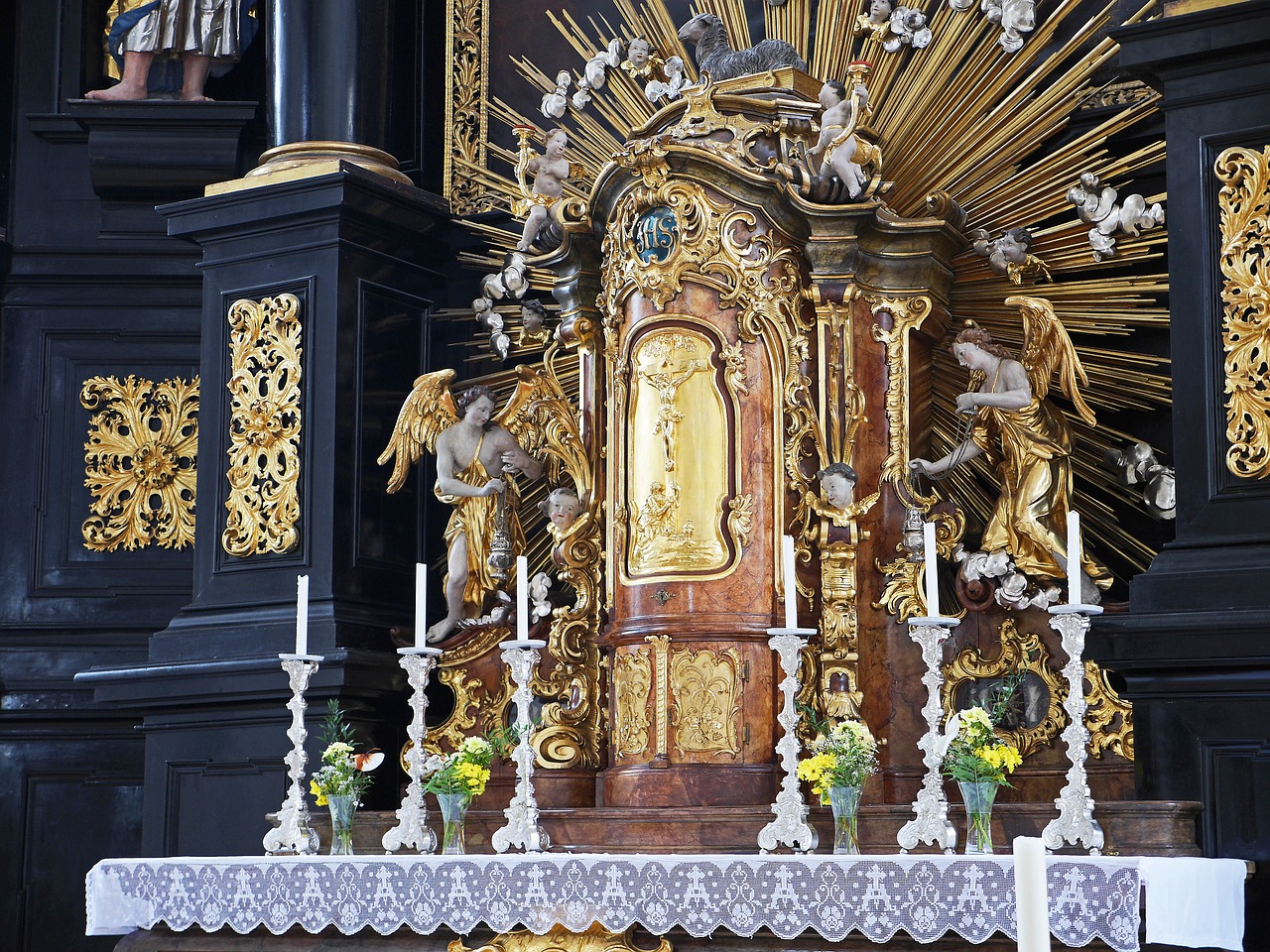
Left: a literal tabernacle.
Photo courtesy of Pixabay
Tabernacle
One of Quebec’s most popular expletives, “tabernacle” is possibly the most used and recognized French cuss word in all of Canada.
A multipurpose swear word applicable across a wide array of everyday life situations, “tabernacle” can be used to express irritation, pleasure, pain, discouragement, outrage, anger, joy, discouragement, excitement, and everything in between. Name an emotion and “tabernacle” can somehow be used to express it.
But What Does Tabernacle Mean?
According to my trusty 1994 edition Oxford dictionary, “tabernacle” was a “portable shrine used by the Israelites during their wanderings in the wilderness.”
According to Oxford’s online definition of tabernacle, it was more specifically “a tent used as a sanctuary for the Ark of the Covenant by the Israelites during the Exodus and until the building of the Temple.”
But in the context of the Roman Catholic Church which once upon a time dominated the religious landscape in Quebec, the “tabernacle” is a box positioned within proximity of if not directly atop a church’s given altar. This conspicuous, heavily-adorned repository is where the host, or Body of Christ, is stored.
How is Tabernacle Used in Everyday Speech?
Rare is the Quebecer who utters tabernacle in reference to the sacred church altar box. But in response to hammering a nail into one’s hand? We’ve all screamed it out at some point. Name a situation, any situation, that involves an emotional reaction and watch “tabernacle” work its cathartic magic.
- Your best bro ran off with your wife? Tabernacle.
- You just won the lottery? Tabernacle!
- Your favorite/most hated reality show contestant just got booted off the show? Say it with me.
How Is Tabernacle Pronounced?
In Quebec and other parts of Canada featuring pockets of French-speaking communities, tabernacle sounds like TAH-BAHR-NACK with an almost silent “r.”
However, a more international French accent would pronounce it TA-BERRR-NAKLUH, with a well-rolled r and a barely audible “uh” at the end.
Why all the church slurs in Quebec?
Up until Quebec’s Quiet Revolution in the 1960s, the Catholic Church had an iron grip on the province’s social and political powers which some historians compare to a dark ages of sorts, with the province of Quebec falling behind the rest of North America on a variety of fronts, including economic development.
Paradoxically, Montreal was at one time competing with New York City to become the North American continent’s leading metropolis. It’s stunning to think that contrary to its past success and dominance at the turn of the 19th century, today’s Montreal has the dubious distinction of being the poorest city in North America.
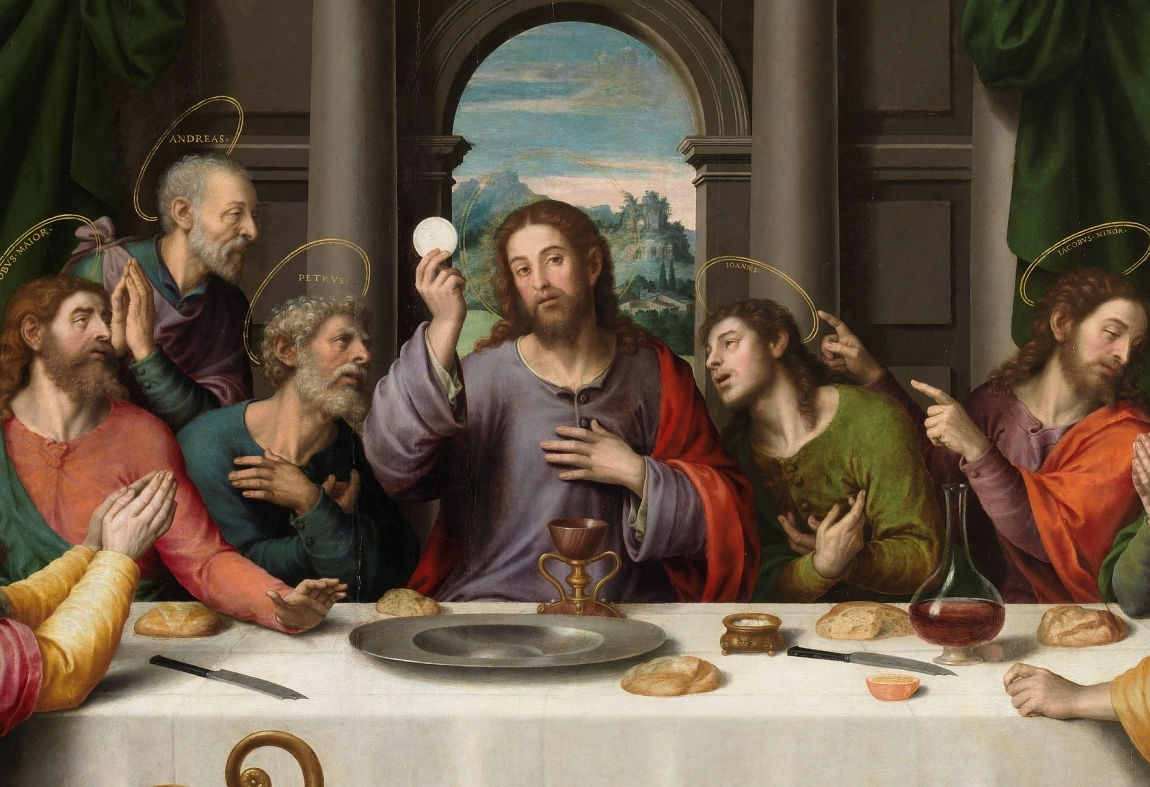
Hostie
A popular French swear word in Quebec, “hostie” is the French word for “host.” But this is not just any host.
In Roman Catholic terms, the host is sacred bread—in North America and throughout much of Europe, the bread is a circular unleavened wafer—that religious adherents believe, once declared holy by the priest, is no longer bread but the actual body of Jesus Christ.
Catholics who have been properly initiated to this ritual by having undergone a First Communion are allowed to then “eat” the body of Christ at Mass, provided they haven’t committed a mortal sin such as envy, driving too fast on the road, or deliberately failing to go to church on Sundays. Eating the host under those circumstances could lead to damnation. Confessing one’s sins to a priest prior to engaging in this Communion prevents such hellfire.
But not all churches adhere to the same operating procedure, as evidenced by the confusion surrounding a hostly controversy in 2009 over Canadian Prime Minister Stephen Harper stuffing the holy host in his pocket.
What can I say? It’s complicated.
From Holy Bread to Expletive
In the context of cursing, “hostie” can mean many things. “Mon hostie!” literally means “my host!” but in Quebec, it’s more along the lines of “you motherf*%^*er!” whereas “hostie!” exclamed by itself in one word is a simple exclamation of irritation, pain, discouragement, outrage, anger, joy, and/or excitement.
How Is Hostie Pronounced?
Pronunciation possibilities are legion and all feature a silent “h.” AUGH-SSSTEE is a common pronunciation as is ESS-ZTEE or simply SSSZTEE. As for its possessive variant, “mon hostie,” try MOAN-AUGH-SSSTEE.
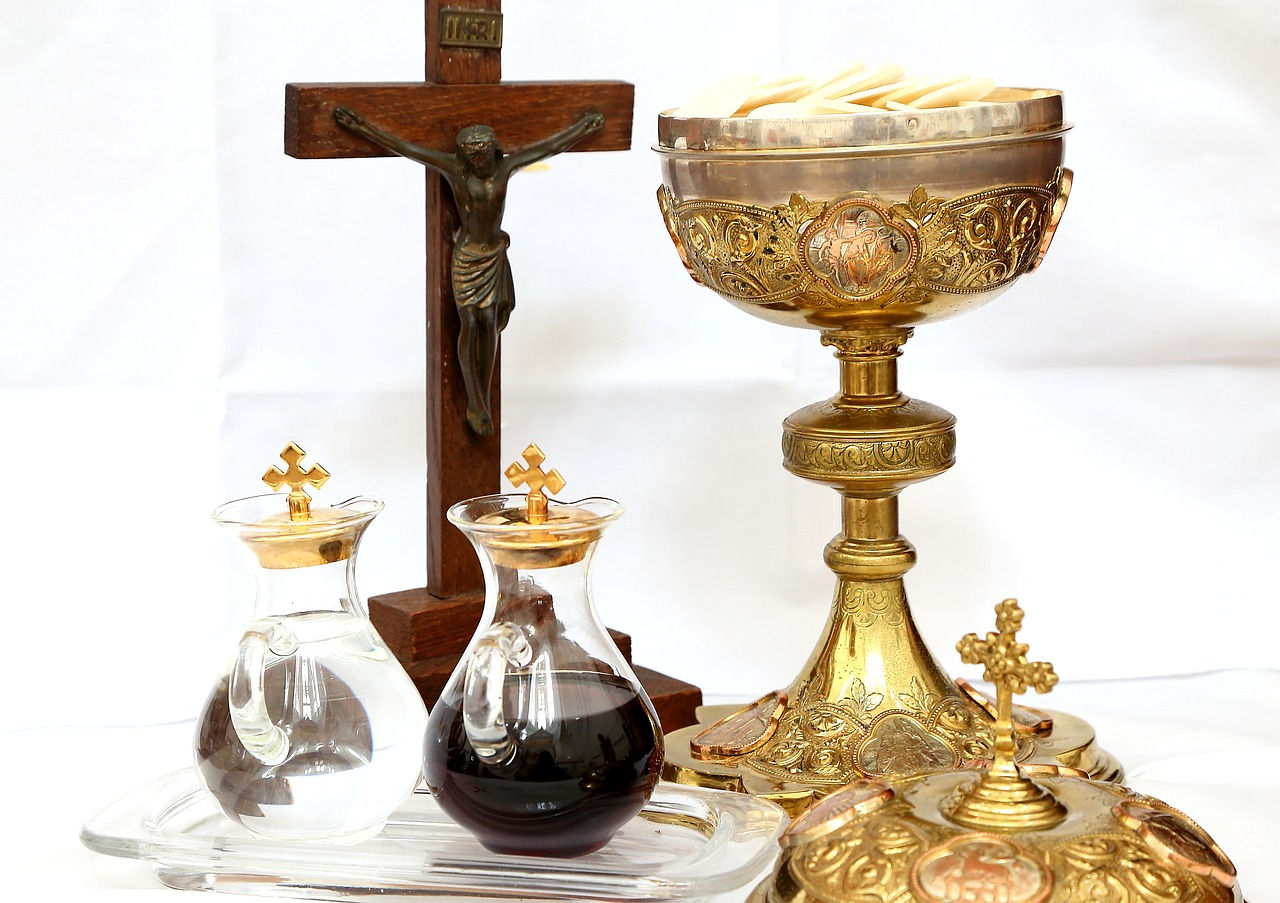
Photo courtesy of Pixabay
Calice
In close contention with “tabernacle” and “hostie” as the ultimate Quebec swear word, “calice” is the French word for chalice, an elegant, embellished goblet typically associated with religious ceremony.
But in Quebec as well as across Canada where other French speakers reside, “calice” is a poster child for curse.
What Does Calice Mean?
In modern day usage, “calice” usually refers to the goblet or cup used during Catholic Mass containing red wine which, when declared holy by the attending priest, is believed by the faithful to become the actual blood of Jesus Christ.
But unlike the “hostie” which Mass attendees get to eat, once the chalice containing the blood of Christ is proclaimed sacred and then lifted in the air, it’s officially consecrated and not for public use. No one at Church gets to drink said blood other than the priest, ostensibly to prevent holy mishaps such as the Blood of Christ spilling on the floor and other such havoc, but I digress.
What Does Calice Mean as a Swear Word?
A fairly gentle curse word—though I wouldn’t belt it out in front of an important client—saying “calice” is kind of like uttering “damn.”
“Calice” is also easily paired with other popular French swear words in Quebec. Think “hostie de calice!” (host of the chalice!) or “calice de tabernacle!” (chalice of the tabernacle!) or “hostie de calice de tabernacle!” (host of the chalice of the tabernacle!)
But that’s not all.
Calice, the Multi-Purpose Verb
“Calice” can also be used as a verb. And it has different meanings, depending on how it’s used.
“Je m’en calice,” for example, translates literally into “I chalice myself,” but means “I don’t care” or “I don’t give a damn.”
“Calice-moi la paix!” is “chalice me some peace!” which relays a certain “leave me alone!”
“Je vais t’en calisser une, mon hostie!” is “I’m going to chalice you one, my host!” but really means, “I’m going to punch you, you motherf%^#*r!”
Also, “crisse de tabernacle, ça va faire là, je calisse mon camp,” translates literally into “Christ of the tabernacle, that is done there, I’m chalicing my camp,” which actually means, “%^&$^$^&^$^%#!!!, I’ve had it, I’m outta here.”
The verbal possibilities are seemingly endless.
How is Calice Pronounced?
Try CAUGH-LISSS and really draw out the CAUUUUUGH to emulate Quebec joual. For a more international accent, simply say CAH-LISS. But if you want to use the word as a curse, stick with CAUGH.
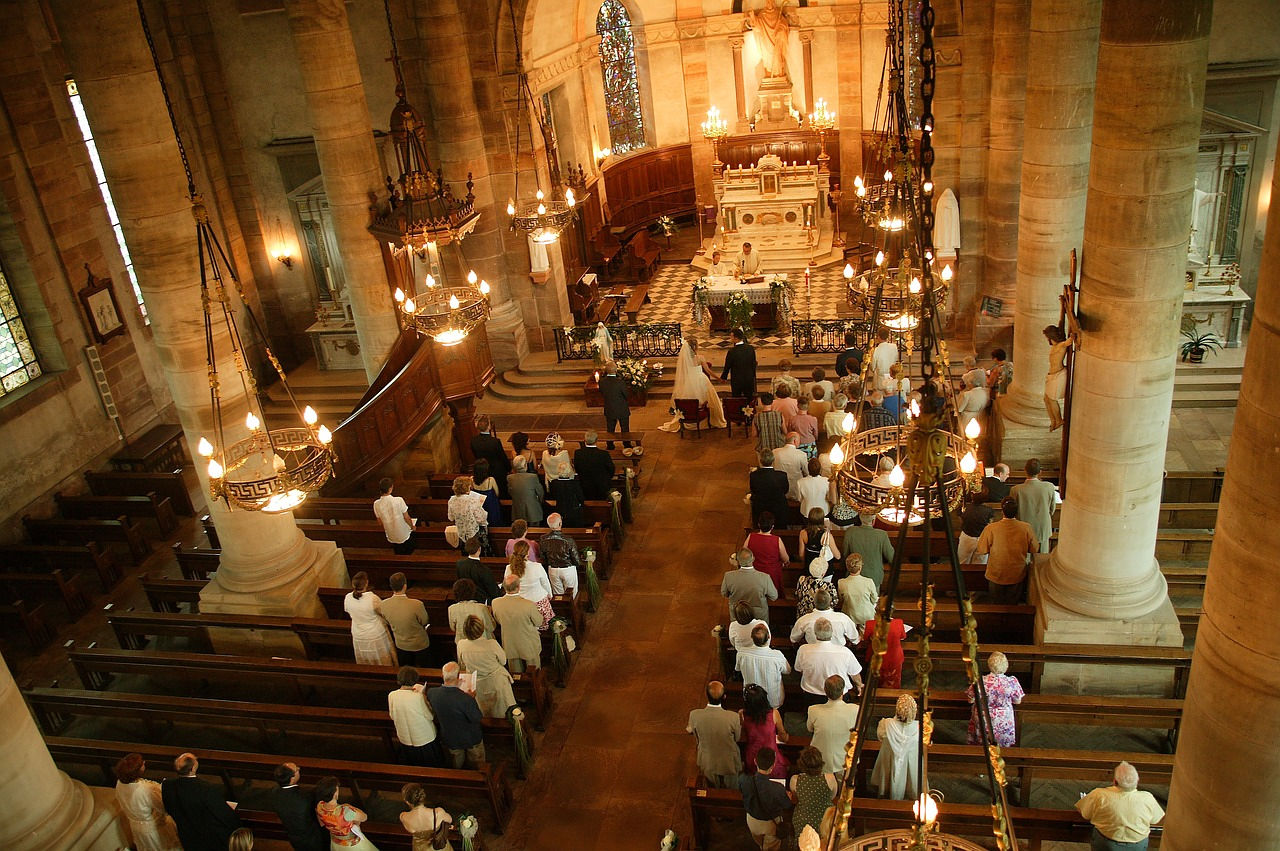
Photo courtesy of Pixabay
Sacrement
One of Quebec’s gentler swear words, “sacrement” is a little harsher than “oh diddly darn.” But barely.
What Does Sacrement Mean?
In the context of Christianity as a whole, “sacrement” refers to a sacred rite. In the context of Roman Catholicism, there are seven sacraments, including baptism, the Holy Communion, and marriage.
But as a curse word, it’s a more or less tame exclamation, about as offensive as “darn!” or “goodness!” But you still wouldn’t say it in front of your grandparents, unless they’re into that kind of thing.
How Is Sacrement Pronounced?
The word is technically pronounced SA-CRUH-MAHN with a rolled “r” and an almost silent “n.” The trick to pronouncing the “n” just right? Block your nose when you say MAHN. That’s your silent N right there.
Wanna nail a Quebec joual accent? Try SA-CRA-MAHN instead.
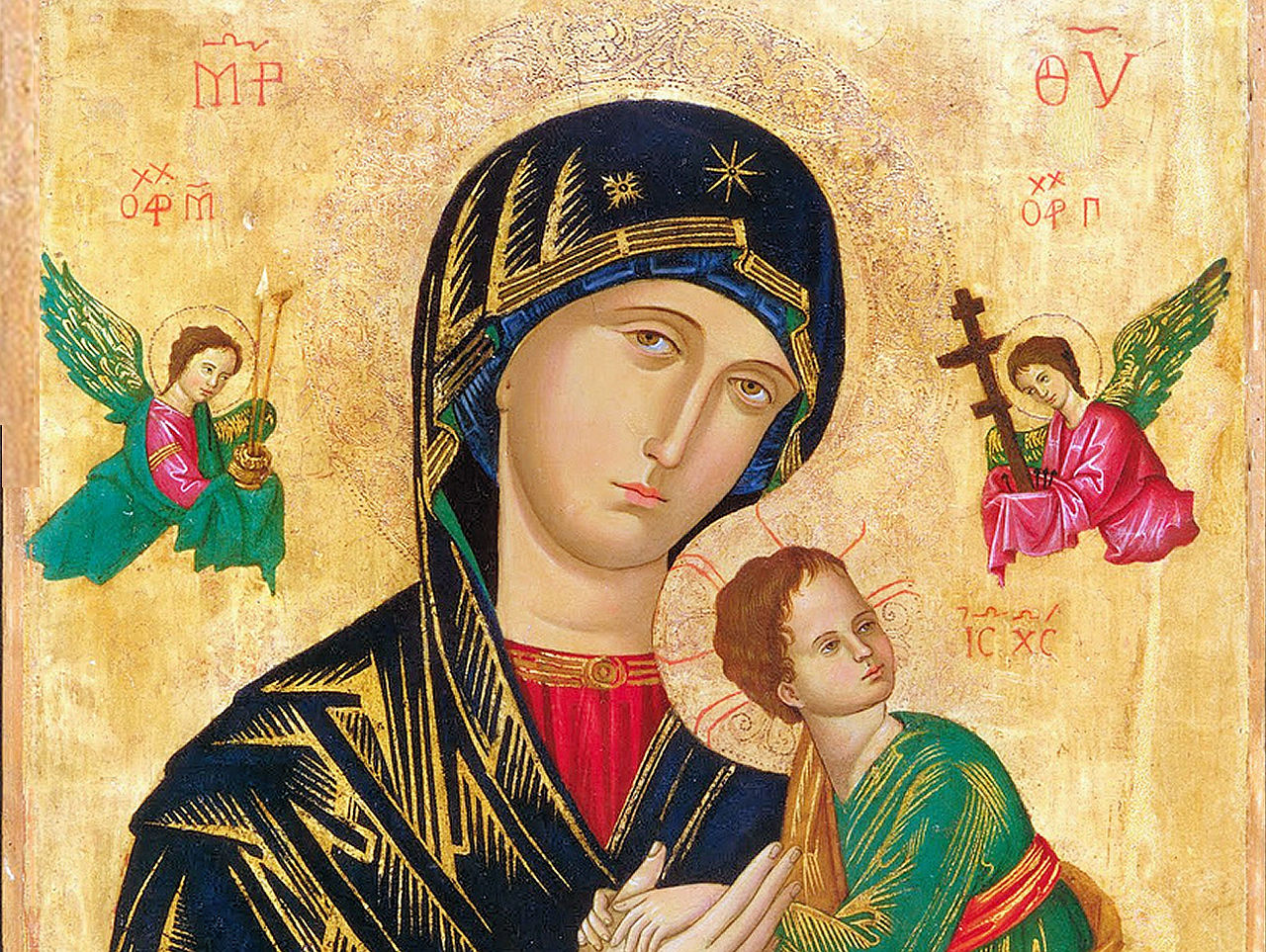
Photo courtesy of Pixabay
Vierge
“Vierge,” the French word for “virgin,” can also be used as a French swear word in Quebec, though it’s not as commonly heard as tabernacle, hostie, and calice.
It’s essentially an alternative to “arghhhh!” To amplify the “arghhhh!” simply tack on additional curse words.
Select Quebec residents enjoy pairing “vierge” with other curses to accomplish said amplification, such as “mon hostie de vierge!” which translates into “my host of the virgin!” and can represent virtuall any emotional reaction.
More creative types might take it a step further with “mon hostie de vierge de tabernacle de calice!” which in literal translation, refers to “my host of the virgin of the tabernacle of the chalice!”
How Is Vierge Pronounced?
Try VEE-ARGH-SHH. And try to keep the ”r” silent. Tricky, but doable.
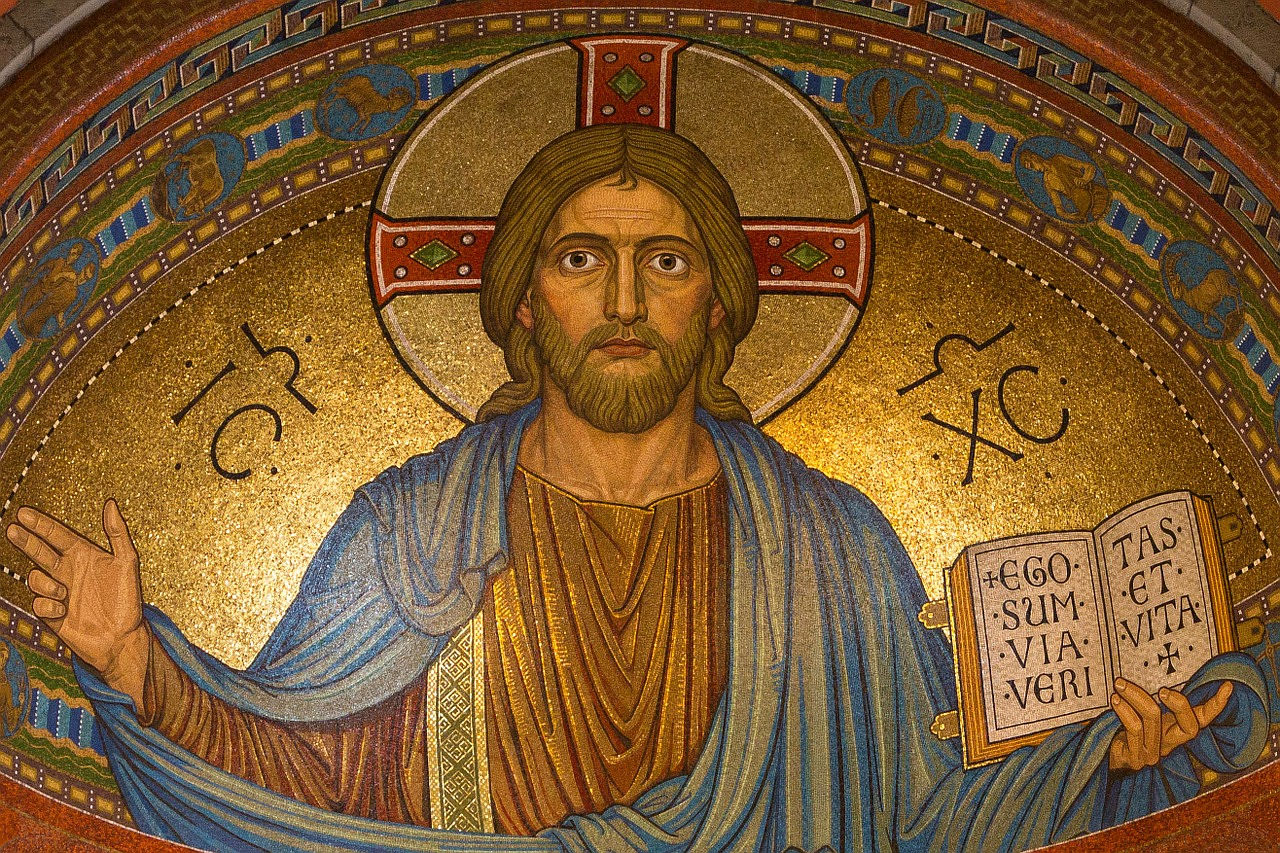
Photo courtesy of Pixabay
Crisse
You say “Christ”? We say “crisse.”
Crisse, The Other Multi-Purpose Verb
Much like “calice,” “crisse” is one of Quebec’s more versatile French swear words and can be employed not only as a noun but as a verb to express a variety of concerns.
The two can actually be used interchangeably. For example, every sample statement I published in the calice swear word explainer can be repeated using “crisse”:
Je m’en calice” = “Je m’en crisse” = “I don’t care” = “I don’t give a damn.”
- “Calice-moi la paix!” = “Crisse-moi la paix!” = “Leave me alone!”
- “Je vais t’en calisser une, mon hostie!” = “Je vais t’en crisser une, mon hostie!” = “I’m going to punch you, motherf%^#*r!”
- “Crisse de tabernacle, ca va faire là, je calisse mon camp” = “Christ of the tabernacle, that is done there, I’m chalicing my camp” = “Calice de tabernacle, ça va faire là, je crisse mon camp” = “Chalice of the tabernacle, that is done there, I’m christing my camp” = “Christ of the tabernacle, I’ve had it, I’m outta here.”
How Is Crisse Pronounced?
It’s basically KISS with a heavily rolled “r” sandwiched in there. In essence, KRRRISS.
Quebec’s Oddball Swear Words:
A How-To
by Evelyn Reid
Originally published on About.com July 23, 2011
French swear words, as with swear words in general, typically make reference to bodily excretions, orificial waste, sexual acts, incest, wedlock-free conception, and sun-deprived body parts.
In Quebec? Not so much. In our usual stubborn manner, we like to do things a little differently here. And our swear words do a spectacular job of verbalizing that. Transforming perfectly innocuous words associated with the Catholic Church into tools of the profane is a regional sport.
First up? Quebec’s best-known swear word of all.

Tabernacle
One of Quebec’s most popular expletives, “tabernacle” is possibly the most used and recognized French cuss word in all of Canada.
A multipurpose swear word applicable across a wide array of everyday life situations, “tabernacle” can be used to express irritation, pleasure, pain, discouragement, outrage, anger, joy, discouragement, excitement, and everything in between. Name an emotion and “tabernacle” can somehow be used to express it.
But What Does Tabernacle Mean?
According to my trusty 1994 edition Oxford dictionary, “tabernacle” was a “portable shrine used by the Israelites during their wanderings in the wilderness.”
According to Oxford’s online definition of tabernacle, it was more specifically “a tent used as a sanctuary for the Ark of the Covenant by the Israelites during the Exodus and until the building of the Temple.”
But in the context of the Roman Catholic Church which once upon a time dominated the religious landscape in Quebec, the “tabernacle” is a box positioned within proximity of if not directly atop a church’s given altar. This conspicuous, heavily-adorned repository is where the host, or Body of Christ, is stored.
How is Tabernacle Used in Everyday Speech?
Rare is the Quebecer who utters tabernacle in reference to the sacred church altar box. But in response to hammering a nail into one’s hand? We’ve all screamed it out at some point. Name a situation, any situation, that involves an emotional reaction and watch “tabernacle” work its cathartic magic.
- Your best bro ran off with your wife? Tabernacle.
- You just won the lottery? Tabernacle!
- Your favorite/most hated reality show contestant just got booted off the show? Say it with me.
How Is Tabernacle Pronounced?
In Quebec and other parts of Canada featuring pockets of French-speaking communities, tabernacle sounds like TAH-BAHR-NACK with an almost silent “r.”
However, a more international French accent would pronounce it TA-BERRR-NAKLUH, with a well-rolled r and a barely audible “uh” at the end.
Why all the church slurs in Quebec?
Up until Quebec’s Quiet Revolution in the 1960s, the Catholic Church had an iron grip on the province’s social and political powers which some historians compare to a dark ages of sorts, with the province of Quebec falling behind the rest of North America on a variety of fronts, including economic development.
Paradoxically, Montreal was at one time competing with New York City to become the North American continent’s leading metropolis. It’s stunning to think that contrary to its past success and dominance at the turn of the 19th century, today’s Montreal has the dubious distinction of being the poorest city in North America.

Hostie
A popular French swear word in Quebec, “hostie” is the French word for “host.” But this is not just any host.
In Roman Catholic terms, the host is sacred bread—in North America and throughout much of Europe, the bread is a circular unleavened wafer—that religious adherents believe, once declared holy by the priest, is no longer bread but the actual body of Jesus Christ.
Catholics who have been properly initiated to this ritual by having undergone a First Communion are allowed to then “eat” the body of Christ at Mass, provided they haven’t committed a mortal sin such as envy, driving too fast on the road, or deliberately failing to go to church on Sundays. Eating the host under those circumstances could lead to damnation. Confessing one’s sins to a priest prior to engaging in this Communion prevents such hellfire.
But not all churches adhere to the same operating procedure, as evidenced by the confusion surrounding a hostly controversy in 2009 over Canadian Prime Minister Stephen Harper stuffing the holy host in his pocket.
What can I say? It’s complicated.
From Holy Bread to Expletive
In the context of cursing, “hostie” can mean many things. “Mon hostie!” literally means “my host!” but in Quebec, it’s more along the lines of “you motherf*%^*er!” whereas “hostie!” exclamed by itself in one word is a simple exclamation of irritation, pain, discouragement, outrage, anger, joy, and/or excitement.
How Is Hostie Pronounced?
Pronunciation possibilities are legion and all feature a silent “h.” AUGH-SSSTEE is a common pronunciation as is ESS-ZTEE or simply SSSZTEE. As for its possessive variant, “mon hostie,” try MOAN-AUGH-SSSTEE.

Calice
In close contention with “tabernacle” and “hostie” as the ultimate Quebec swear word, “calice” is the French word for chalice, an elegant, embellished goblet typically associated with religious ceremony.
But in Quebec as well as across Canada where other French speakers reside, “calice” is a poster child for curse.
What Does Calice Mean?
In modern day usage, “calice” usually refers to the goblet or cup used during Catholic Mass containing red wine which, when declared holy by the attending priest, is believed by the faithful to become the actual blood of Jesus Christ.
But unlike the “hostie” which Mass attendees get to eat, once the chalice containing the blood of Christ is proclaimed sacred and then lifted in the air, it’s officially consecrated and not for public use. No one at Church gets to drink said blood other than the priest, ostensibly to prevent holy mishaps such as the Blood of Christ spilling on the floor and other such havoc, but I digress.
What Does Calice Mean as a Swear Word?
A fairly gentle curse word—though I wouldn’t belt it out in front of an important client—saying “calice” is kind of like uttering “damn.”
“Calice” is also easily paired with other popular French swear words in Quebec. Think “hostie de calice!” (host of the chalice!) or “calice de tabernacle!” (chalice of the tabernacle!) or “hostie de calice de tabernacle!” (host of the chalice of the tabernacle!)
But that’s not all.
Calice, the Multi-Purpose Verb
“Calice” can also be used as a verb. And it has different meanings, depending on how it’s used.
“Je m’en calice,” for example, translates literally into “I chalice myself,” but means “I don’t care” or “I don’t give a damn.”
“Calice-moi la paix!” is “chalice me some peace!” which relays a certain “leave me alone!”
“Je vais t’en calisser une, mon hostie!” is “I’m going to chalice you one, my host!” but really means, “I’m going to punch you, you motherf%^#*r!”
Also, “crisse de tabernacle, ça va faire là, je calisse mon camp,” translates literally into “Christ of the tabernacle, that is done there, I’m chalicing my camp,” which actually means, “%^&$^$^&^$^%#!!!, I’ve had it, I’m outta here.”
The verbal possibilities are seemingly endless.
How is Calice Pronounced?
Try CAUGH-LISSS and really draw out the CAUUUUUGH to emulate Quebec joual. For a more international accent, simply say CAH-LISS. But if you want to use the word as a curse, stick with CAUGH.

Sacrement
One of Quebec’s gentler swear words, “sacrement” is a little harsher than “oh diddly darn.” But barely.
What Does Sacrement Mean?
In the context of Christianity as a whole, “sacrement” refers to a sacred rite. In the context of Roman Catholicism, there are seven sacraments, including baptism, the Holy Communion, and marriage.
But as a curse word, it’s a more or less tame exclamation, about as offensive as “darn!” or “goodness!” But you still wouldn’t say it in front of your grandparents, unless they’re into that kind of thing.
How Is Sacrement Pronounced?
The word is technically pronounced SA-CRUH-MAHN with a rolled “r” and an almost silent “n.” The trick to pronouncing the “n” just right? Block your nose when you say MAHN. That’s your silent N right there.
Wanna nail a Quebec joual accent? Try SA-CRA-MAHN instead.

Vierge
“Vierge,” the French word for “virgin,” can also be used as a French swear word in Quebec, though it’s not as commonly heard as tabernacle, hostie, and calice.
It’s essentially an alternative to “arghhhh!” To amplify the “arghhhh!” simply tack on additional curse words.
Select Quebec residents enjoy pairing “vierge” with other curses to accomplish said amplification, such as “mon hostie de vierge!” which translates into “my host of the virgin!” and can represent virtuall any emotional reaction.
More creative types might take it a step further with “mon hostie de vierge de tabernacle de calice!” which in literal translation, refers to “my host of the virgin of the tabernacle of the chalice!”
How Is Vierge Pronounced?
Try VEE-ARGH-SHH. And try to keep the ”r” silent. Tricky, but doable.

Crisse
You say “Christ”? We say “crisse.”
Crisse, The Other Multi-Purpose Verb
Much like “calice,” “crisse” is one of Quebec’s more versatile French swear words and can be employed not only as a noun but as a verb to express a variety of concerns.
The two can actually be used interchangeably. For example, every sample statement I published in the calice swear word explainer can be repeated using “crisse”:
Je m’en calice” = “Je m’en crisse” = “I don’t care” = “I don’t give a damn.”
- “Calice-moi la paix!” = “Crisse-moi la paix!” = “Leave me alone!”
- “Je vais t’en calisser une, mon hostie!” = “Je vais t’en crisser une, mon hostie!” = “I’m going to punch you, motherf%^#*r!”
- “Crisse de tabernacle, ca va faire là, je calisse mon camp” = “Christ of the tabernacle, that is done there, I’m chalicing my camp” = “Calice de tabernacle, ça va faire là, je crisse mon camp” = “Chalice of the tabernacle, that is done there, I’m christing my camp” = “Christ of the tabernacle, I’ve had it, I’m outta here.”
How Is Crisse Pronounced?
It’s basically KISS with a heavily rolled “r” sandwiched in there. In essence, KRRRISS.


